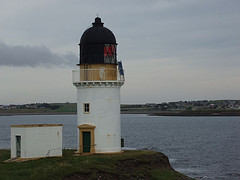 Parliament in London is debating this afternoon whether to commission a replacement for the nuclear submarine programme, commonly referred to as Trident. This consists of four nuclear submarines, which will be at sea for six months at a time. They are based at Faslane, northwest of Glasgow. Trident is basically the nuclear deterrent of the United Kingdom, containing several dozen nuclear warheads. Each of those could kill one million people at a stroke.
Parliament in London is debating this afternoon whether to commission a replacement for the nuclear submarine programme, commonly referred to as Trident. This consists of four nuclear submarines, which will be at sea for six months at a time. They are based at Faslane, northwest of Glasgow. Trident is basically the nuclear deterrent of the United Kingdom, containing several dozen nuclear warheads. Each of those could kill one million people at a stroke. The governing Labour party is arguing that the design and commissioning of Trident's replacement takes 17 years, and the current submarine programme reaches the end of its useful life in 2025. The cost of replacing Trident is about £20 billion, $40 billion.
The politics are interesting. A large number of Labour MPs are opposed, but the Opposition Conservative Party is in favour, which makes it a certainty that the government will win the day. It is politically embarrassing for Labour to have to count on Opposition support to win a vote in Parliament.
The main argument centres around the question whether a nuclear deterrent is still required in the second quarter of the 21st century. The Soviet Union, which Trident and before it Polaris, held at bay is no more. The relationship with its successor state, Russia, is a lot more cooperative and not one based on enmity. The Government asserts that apart from the original nuclear clique, USA, UK, France, USSR and China, other nations are acquiring nuclear weapons. Israel will not admit to having nuclear weapons, but is not a problem.
The problem lies with states like Pakistan and India, which have been at war with each other at least three times over the past 60 years. It's even worse with North Korea, a country governed by at best a capricious leadership. Concern is rising with regards to Iran, which is acquiring nuclear technology for civilian use, according to its president. What if nuclear material were to fall into the hands of groups, supported by Iran, which are very hostile to the USA and its allies.
On the other hand, the question can be asked why nuclear technology should be denied to nations when countries like the UK go about upgrading their nuclear weaponry. It is also debatable whether the threat to countries like Britain and America actually emanates from a whole nation. It is beginning to shift more to very dispersed groups like Al Qa'eda, which you cannot lob a nuke at.
I think that the world has certainly changed since the 1980s, and the question does needs asking whether a nuclear deterrant is required. The British government stands to commit itself to huge financial expenditure which will have an impact over the next 45 years.
Global politics will continue to change, and I somehow think that not enough foresight is being applied in this particular instance. Nonetheless, personally, I cannot commit myself to saying whether I oppose Trident or not. The situation is on the cusp between two models of world politics, and it is a gamble to commit yourself to either.
Acknowledgement: The Trident emblem is courtesy Society of Creative Anachronism.
Technorati Tags: trident












I do agree that we're in a different world now, with global politics as fickle as ever. One thing sticks to my mind, however: Werner Von Braun, former Nazi who helped the US build its nukes, and by extraction so many other countries, once said "If you have a nuclear device, someday, someone will use it." Good post Guido. xoxo CATHY
ReplyDeleteWell I am not sure where you stand on this situation. But I for one am against all nuclear arms. why should we think that we are more responsible than other governments ? (even if we think we are !!) as the precious writer so rightly said at some time someone will pull the trigger if we have the weapons...and who would win in a situation such as that ?
ReplyDeleteThe cost of replacing Trident is said to be £20 billon....TODAY....what would it cost in the end...imagine loading that debt on to future generations. No for once I am behind the majority of labour MPs.
Tough call, as you say... for either choice.
ReplyDeletebe well,
Dawn
ps... I have been around to the journals you list lending support...